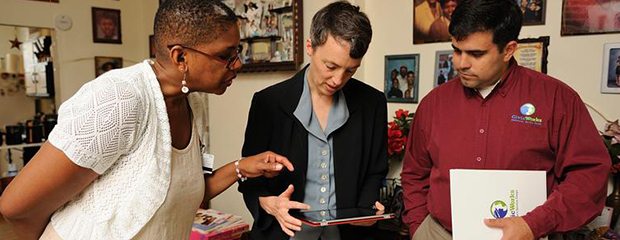From my older house-call patients in West Baltimore, I learned about the impact of the home environment. I saw patients who slept on their couches because they could not get upstairs to the bedroom, a person who had to navigate the kitchen with one half of his body paralyzed, and a 101-year-old woman who could not get into the kitchen with her wheelchair and had to crawl to the refrigerator.
Each patient had chronic conditions which we addressed together with medications, teaching, and encouragement. But what they taught me was that their blood pressure or diabetes were not priorities compared to being able to move around their home, sleep well, prepare food, and be free of pain. Based on what I learned and how little impact medical management had on their immediate quality of life, together with my colleague Laura Gitlin, we developed the CAPABLE program to holistically address these needs.
CAPABLE is a home-based program of an interprofessional team – an occupational therapist, a nurse, and a handyman – who work with low-income older adults for five months on what they identify as their most important goals. These include safely bathing, getting upstairs, or getting down their front steps. The occupational therapist and nurse unlock the participants’ motivation and energy by focusing on these goals, and the handyman implements changes like second banisters and lighting on the stairs. “I can’t tell you how much the handrail and the shower chair mean. It use to hurt to stand and shower. The shower head really helps me reach places I couldn’t reach before,” explains one patient, a 67-year-old man.
Six years later, CAPABLE has served more than 400 people. Although we’ve seen with our own eyes that lives were changing due the program, the data confirm these stories. CAPABLE is associated with cutting disability in half and decreasing depressive symptoms by as much as an antidepressant. The magnitude of this change is astonishing, even to our own team. The leading health policy journal, Health Affairs, recently published results showing that the program, which costs less than $3,000, saves more than $10,000 to Medicare in decreased outpatient and hospital costs, including observation stays and hospital readmissions.
Now CAPABLE has spread to 12 cities in five states based on the evidence collected here at the Johns Hopkins School of Nursing. Hopefully, approaches like CAPABLE can help clinicians and health policy makers see that physical function is a great target for improving health and decreasing costs while helping older adults achieve their own goals.
ABOUT THE AUTHOR

Sarah L. Szanton, PhD, ANP, FAAN is a Professor at the Johns Hopkins University School of Nursing with a joint appointment in the Department of Health Policy and Management at the Johns Hopkins Bloomberg School of Public Health. Her work particularly focuses on ways to help older adults “age in place” as they grow older.
